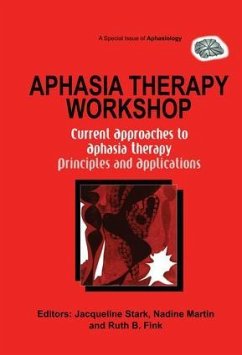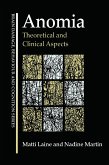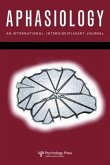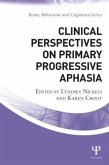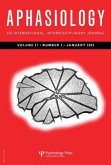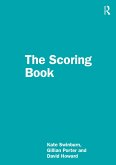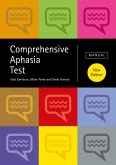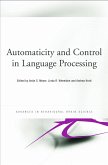Aphasia Therapy Workshop: Current Approaches to Aphasia Therapy - Principles and Applications
A Special Issue of Aphasiology
Herausgeber: Stark, Jacqueline Ann; Fink, Ruth
Aphasia Therapy Workshop: Current Approaches to Aphasia Therapy - Principles and Applications
A Special Issue of Aphasiology
Herausgeber: Stark, Jacqueline Ann; Fink, Ruth
- Broschiertes Buch
- Merkliste
- Auf die Merkliste
- Bewerten Bewerten
- Teilen
- Produkt teilen
- Produkterinnerung
- Produkterinnerung
The Aphasia Therapy Workshop brings together leading experts in the field of aphasia to address current approaches to aphasia rehabilitation. The papers reflect the variety of approaches to treatment of aphasia and provide the reader with an update on the most current advances in our theories and practice of aphasia rehabilitation.
Andere Kunden interessierten sich auch für
![Anomia Anomia]() Matti LaineAnomia78,99 €
Matti LaineAnomia78,99 €![Issues in Bilingual Aphasia Issues in Bilingual Aphasia]() Issues in Bilingual Aphasia53,99 €
Issues in Bilingual Aphasia53,99 €![Clinical Perspectives on Primary Progressive Aphasia Clinical Perspectives on Primary Progressive Aphasia]() Clinical Perspectives on Primary Progressive Aphasia83,99 €
Clinical Perspectives on Primary Progressive Aphasia83,99 €![Quality of Life in Aphasia Quality of Life in Aphasia]() Audrey Holland / Linda Worrall (eds.)Quality of Life in Aphasia54,99 €
Audrey Holland / Linda Worrall (eds.)Quality of Life in Aphasia54,99 €![Comprehensive Aphasia Test Comprehensive Aphasia Test]() David HowardComprehensive Aphasia Test55,99 €
David HowardComprehensive Aphasia Test55,99 €![Comprehensive Aphasia Test Comprehensive Aphasia Test]() David HowardComprehensive Aphasia Test314,99 €
David HowardComprehensive Aphasia Test314,99 €![Automaticity and Control in Language Processing Automaticity and Control in Language Processing]() Automaticity and Control in Language Processing52,99 €
Automaticity and Control in Language Processing52,99 €-
-
-
The Aphasia Therapy Workshop brings together leading experts in the field of aphasia to address current approaches to aphasia rehabilitation. The papers reflect the variety of approaches to treatment of aphasia and provide the reader with an update on the most current advances in our theories and practice of aphasia rehabilitation.
Hinweis: Dieser Artikel kann nur an eine deutsche Lieferadresse ausgeliefert werden.
Hinweis: Dieser Artikel kann nur an eine deutsche Lieferadresse ausgeliefert werden.
Produktdetails
- Produktdetails
- Verlag: Taylor & Francis Ltd (Sales)
- Seitenzahl: 196
- Erscheinungstermin: 1. November 2015
- Englisch
- Abmessung: 244mm x 165mm x 13mm
- Gewicht: 295g
- ISBN-13: 9781138877641
- ISBN-10: 1138877646
- Artikelnr.: 42796747
- Herstellerkennzeichnung
- Libri GmbH
- Europaallee 1
- 36244 Bad Hersfeld
- gpsr@libri.de
- Verlag: Taylor & Francis Ltd (Sales)
- Seitenzahl: 196
- Erscheinungstermin: 1. November 2015
- Englisch
- Abmessung: 244mm x 165mm x 13mm
- Gewicht: 295g
- ISBN-13: 9781138877641
- ISBN-10: 1138877646
- Artikelnr.: 42796747
- Herstellerkennzeichnung
- Libri GmbH
- Europaallee 1
- 36244 Bad Hersfeld
- gpsr@libri.de
Jacqueline Ann Stark, Ruth Fink, Nadine Martin
J. Stark
N. Martin
R. Fink
Current Approaches to Aphasia Therapy: Principles and Applications. S. Byng
J.F. Duchan
Social Model Philosophies and Principles: Their Applications to Therapies for Aphasia. L. Worrall
T. Rose
T. Howe
A. Brennan
J. Egan
D. Oxenham
K. McKenna
Access to Written Information for People with Aphasia. M.C. Linebarger
M.F. Schwartz
AAC for Hypothesis Testing and Treatment of Aphasic Language Production: Lessons from a 'Processing Prosthesis'. R. Fink
A. Brecher
P. Sobel
M.F. Schwartz
Computer-assisted Treatment of Word Retrieval Deficits in Aphasia. G.A. Stefanatos
A. Gershkoff
S. Madigan
Computer-mediated Tools for the Investigation and Rehabilitation of Auditory and Phonological Processing in Aphasia. J.J. Hinckley
T.H. Carr
Comparing the Outcomes of Intensive and Non-intensive Context-based Aphasia Treatment. A. Basso
How Intensive-prolonged should an Intensive-prolonged Treatment be? A.E. Hillis
J. Heidler
Contributions and Limitations of "The Cognitive Neuropsychological Approach" to Treatment: Illustrations from Studies of Reading and Spelling Therapy. B. Rapp
The Relationship between Treatment Outcomes and the Underlying Cognitive Deficit: Evidence from the Remediation of Acquired Dysgraphia. J. Marshall
D. Cairns
Therapy for Sentence Processing Problems in Aphasia: Working on Thinking for Speaking. C.K. Thompson
L.P. Shapiro
Treating Agrammatic Aphasia within a Linguistic Framework: Treatment of Underlying Forms. N. Friedmann
Degrees of Severity and Recovery in Agrammatism: Climbing up the Syntactic Tree. M. Nicholas
M.P. Sinotte
N. H-Estabrooks
Using a Computer to Communicate: Effect of Executive Function Impairments in People with Severe Aphasia. G. Ramsburger
Achieving Conversational Success in Aphasia by Focusing on Nonlinguistic Cognitive Skills; a Potentially Promising New Approach. J.A. Stark
Analysing the Language Therapy Process - The Implicit Role of Learning and Memory.
N. Martin
R. Fink
Current Approaches to Aphasia Therapy: Principles and Applications. S. Byng
J.F. Duchan
Social Model Philosophies and Principles: Their Applications to Therapies for Aphasia. L. Worrall
T. Rose
T. Howe
A. Brennan
J. Egan
D. Oxenham
K. McKenna
Access to Written Information for People with Aphasia. M.C. Linebarger
M.F. Schwartz
AAC for Hypothesis Testing and Treatment of Aphasic Language Production: Lessons from a 'Processing Prosthesis'. R. Fink
A. Brecher
P. Sobel
M.F. Schwartz
Computer-assisted Treatment of Word Retrieval Deficits in Aphasia. G.A. Stefanatos
A. Gershkoff
S. Madigan
Computer-mediated Tools for the Investigation and Rehabilitation of Auditory and Phonological Processing in Aphasia. J.J. Hinckley
T.H. Carr
Comparing the Outcomes of Intensive and Non-intensive Context-based Aphasia Treatment. A. Basso
How Intensive-prolonged should an Intensive-prolonged Treatment be? A.E. Hillis
J. Heidler
Contributions and Limitations of "The Cognitive Neuropsychological Approach" to Treatment: Illustrations from Studies of Reading and Spelling Therapy. B. Rapp
The Relationship between Treatment Outcomes and the Underlying Cognitive Deficit: Evidence from the Remediation of Acquired Dysgraphia. J. Marshall
D. Cairns
Therapy for Sentence Processing Problems in Aphasia: Working on Thinking for Speaking. C.K. Thompson
L.P. Shapiro
Treating Agrammatic Aphasia within a Linguistic Framework: Treatment of Underlying Forms. N. Friedmann
Degrees of Severity and Recovery in Agrammatism: Climbing up the Syntactic Tree. M. Nicholas
M.P. Sinotte
N. H-Estabrooks
Using a Computer to Communicate: Effect of Executive Function Impairments in People with Severe Aphasia. G. Ramsburger
Achieving Conversational Success in Aphasia by Focusing on Nonlinguistic Cognitive Skills; a Potentially Promising New Approach. J.A. Stark
Analysing the Language Therapy Process - The Implicit Role of Learning and Memory.
J. Stark
N. Martin
R. Fink
Current Approaches to Aphasia Therapy: Principles and Applications. S. Byng
J.F. Duchan
Social Model Philosophies and Principles: Their Applications to Therapies for Aphasia. L. Worrall
T. Rose
T. Howe
A. Brennan
J. Egan
D. Oxenham
K. McKenna
Access to Written Information for People with Aphasia. M.C. Linebarger
M.F. Schwartz
AAC for Hypothesis Testing and Treatment of Aphasic Language Production: Lessons from a 'Processing Prosthesis'. R. Fink
A. Brecher
P. Sobel
M.F. Schwartz
Computer-assisted Treatment of Word Retrieval Deficits in Aphasia. G.A. Stefanatos
A. Gershkoff
S. Madigan
Computer-mediated Tools for the Investigation and Rehabilitation of Auditory and Phonological Processing in Aphasia. J.J. Hinckley
T.H. Carr
Comparing the Outcomes of Intensive and Non-intensive Context-based Aphasia Treatment. A. Basso
How Intensive-prolonged should an Intensive-prolonged Treatment be? A.E. Hillis
J. Heidler
Contributions and Limitations of "The Cognitive Neuropsychological Approach" to Treatment: Illustrations from Studies of Reading and Spelling Therapy. B. Rapp
The Relationship between Treatment Outcomes and the Underlying Cognitive Deficit: Evidence from the Remediation of Acquired Dysgraphia. J. Marshall
D. Cairns
Therapy for Sentence Processing Problems in Aphasia: Working on Thinking for Speaking. C.K. Thompson
L.P. Shapiro
Treating Agrammatic Aphasia within a Linguistic Framework: Treatment of Underlying Forms. N. Friedmann
Degrees of Severity and Recovery in Agrammatism: Climbing up the Syntactic Tree. M. Nicholas
M.P. Sinotte
N. H-Estabrooks
Using a Computer to Communicate: Effect of Executive Function Impairments in People with Severe Aphasia. G. Ramsburger
Achieving Conversational Success in Aphasia by Focusing on Nonlinguistic Cognitive Skills; a Potentially Promising New Approach. J.A. Stark
Analysing the Language Therapy Process - The Implicit Role of Learning and Memory.
N. Martin
R. Fink
Current Approaches to Aphasia Therapy: Principles and Applications. S. Byng
J.F. Duchan
Social Model Philosophies and Principles: Their Applications to Therapies for Aphasia. L. Worrall
T. Rose
T. Howe
A. Brennan
J. Egan
D. Oxenham
K. McKenna
Access to Written Information for People with Aphasia. M.C. Linebarger
M.F. Schwartz
AAC for Hypothesis Testing and Treatment of Aphasic Language Production: Lessons from a 'Processing Prosthesis'. R. Fink
A. Brecher
P. Sobel
M.F. Schwartz
Computer-assisted Treatment of Word Retrieval Deficits in Aphasia. G.A. Stefanatos
A. Gershkoff
S. Madigan
Computer-mediated Tools for the Investigation and Rehabilitation of Auditory and Phonological Processing in Aphasia. J.J. Hinckley
T.H. Carr
Comparing the Outcomes of Intensive and Non-intensive Context-based Aphasia Treatment. A. Basso
How Intensive-prolonged should an Intensive-prolonged Treatment be? A.E. Hillis
J. Heidler
Contributions and Limitations of "The Cognitive Neuropsychological Approach" to Treatment: Illustrations from Studies of Reading and Spelling Therapy. B. Rapp
The Relationship between Treatment Outcomes and the Underlying Cognitive Deficit: Evidence from the Remediation of Acquired Dysgraphia. J. Marshall
D. Cairns
Therapy for Sentence Processing Problems in Aphasia: Working on Thinking for Speaking. C.K. Thompson
L.P. Shapiro
Treating Agrammatic Aphasia within a Linguistic Framework: Treatment of Underlying Forms. N. Friedmann
Degrees of Severity and Recovery in Agrammatism: Climbing up the Syntactic Tree. M. Nicholas
M.P. Sinotte
N. H-Estabrooks
Using a Computer to Communicate: Effect of Executive Function Impairments in People with Severe Aphasia. G. Ramsburger
Achieving Conversational Success in Aphasia by Focusing on Nonlinguistic Cognitive Skills; a Potentially Promising New Approach. J.A. Stark
Analysing the Language Therapy Process - The Implicit Role of Learning and Memory.

